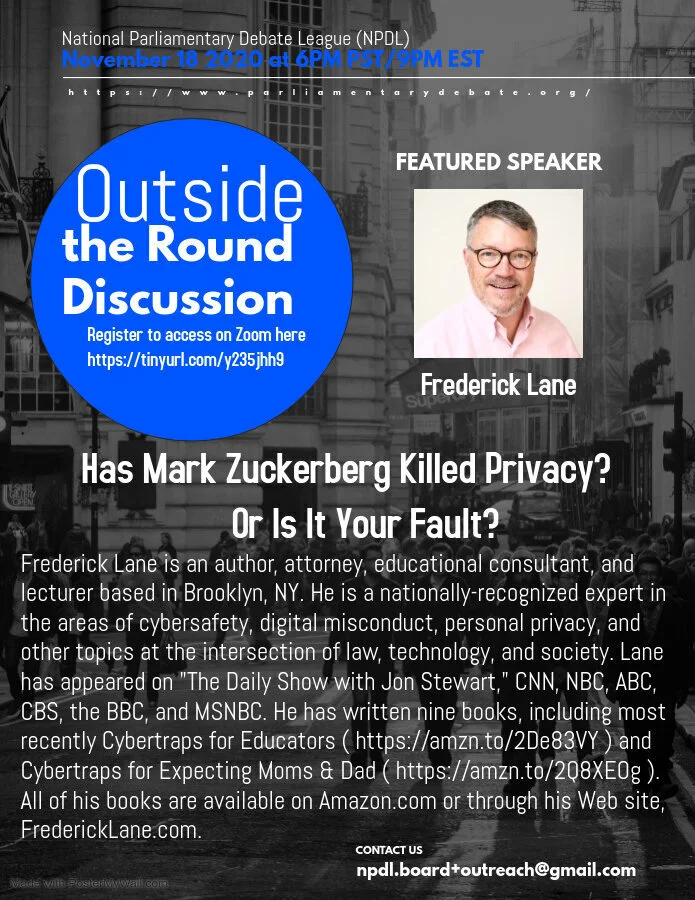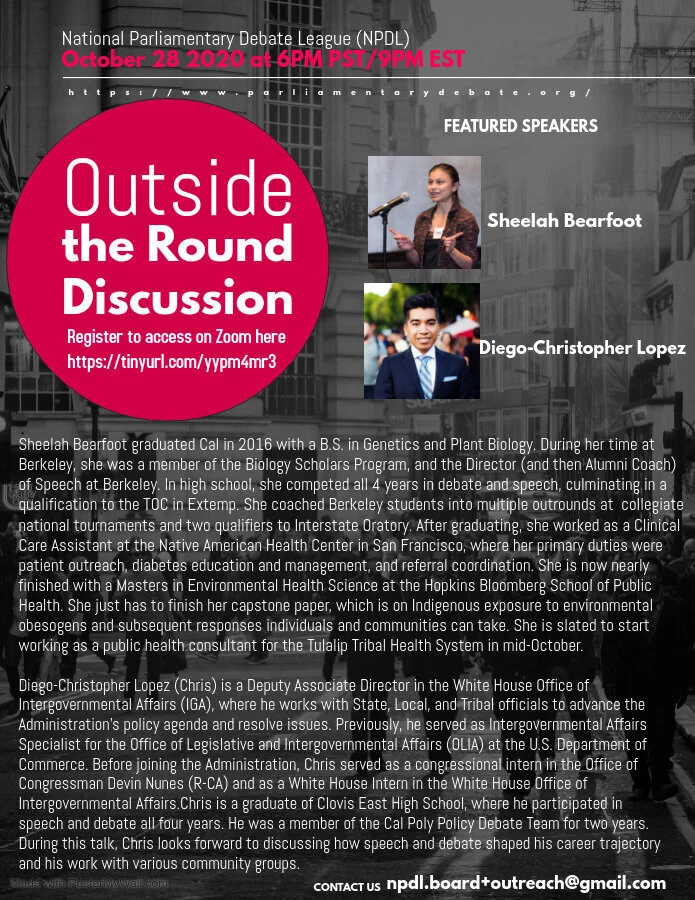By Kyle Hietala, NPDL President
April 4, 2025
Our League is guided by a volunteer Board of Directors—individuals who contribute their time, expertise, and energy to promote accessible, educational, and impactful parliamentary debate for students nationwide. Each year, our member schools and their representatives elect our board to shape the direction of the League. If you’re passionate about debate, interested in education, and eager to guide a growing national organization, I hope you’ll consider running—both for what you will gain and for what you will give.
Personal Growth Through Leadership
For me, serving on our board has been a challenging and meaningful leadership experience that has given me new friends and a greater appreciation for the diversity of our community. It takes collaboration, initiative, and vision to be effective at organizational planning, policy development, strategic outreach, and long-term decision-making. Board members contribute to a wide range of projects—from developing tournament infrastructure and digital resources, to improving equity protocols and strengthening partnerships with schools across the country. These efforts help board members develop skills in project management, nonprofit governance, and team leadership—which translate directly to both academic and professional contexts.
Meaningful Impact on Others
While personal development is a meaningful benefit, the most compelling reason for most folks who serve on the NPDL Board is the impact you can make on others. I’m unapologetically convinced that parli isn’t just a better form of debate – but the best type of competitive debate, no matter which style(s) of parli one does. Motions (as opposed to resolutions) incentivize real-world research skills and promote broad, balanced knowledge acquisition. Partnerships halve the ratio of required judges for tournaments and facilitate more collaboration and teamwork. Longer speech times enable in-depth development of argumentation.
Serving on the Board gives you the leverage to promote a form of debate that is uniquely effective at helping students develop confidence, critical thinking, civic awareness, and the ability to engage in respectful dialogue. Board members make decisions that shape the competitive season, support students and coaches, and remove barriers that have historically limited participation. Whether you're working to introduce new schools to the activity, improve the quality of tournaments, or develop mentorship initiatives, your efforts as a board member directly impact hundreds (if not thousands) of students each year.
Who Should Run?
One of my favorite poets, William Butler Yeats, wrote that “the best lack all conviction, while the worst are full of passionate intensity.” The last two years would’ve pleased W.B., I think, as our board has been made up of reasonable folks who’ve usually sought to compromise with each other and reach consensus. Not all of our decisions have been unanimous, but we’ve shared a mutual respect for each other and a sense of humility. We chide each other sometimes and thank each other often, as we appreciate working together and see a shared purpose to our work.
We welcome any adult who believes in debate and subscribes to the ‘we before me’ vision of leadership. You need not be a former competitor or coach to serve – educators, alumni, and citizen advocates are all welcome and encouraged to run. Whether you bring a decade of coaching experience or a fresh outside perspective, what matters most is a commitment to serving students and a willingness to work with others. You don’t need to have all the answers—but you should be ready to ask honest questions, work collaboratively, and help move the organization forward.
The Opportunity Ahead
When I was elected President two years ago, the NPDL had a reputation as a mercurial organization rife with conflicts – I was cautioned of scathing open letters, contentious community meetings, and tournaments halted by mass protests. Now, we tend to look back on the days when rules were ‘written in blood’ as part of an increasingly distant past, and look more toward an aspirational, inclusive future.
We have a lot of work left to do, and I think our next board has a crucial opportunity to answer big questions about the mission, vision, and values of our organization. In seeking a 3rd term as President, my focus would be on cultural and organizational transformation. My priorities would include substantially streamlining rules, policies, and procedures that tend to waste our time and energy. I’d strive to build fundraising capacity, and invest more resources in tournament growth and quality improvements, hire contract-based staff to accelerate resource production, and develop regional and national partnerships to promote student participation. I think it’s time for the NPDL to become a truly reputable, national organization with a clear mission and vision.
Of course, you might disagree with that vision, in which case my advice to you would be exactly the same: run for board, perhaps by running against me. Our member schools, coaches, and students deserve to have many excellent, qualified candidates to choose from, and I sincerely hope you’ll consider serving. If you have any questions about serving, you can learn more here.
How To Run
If you’re interested in serving on the Board, please email your Statement of Interest to npdl.elections@gmail.com by this Saturday, April 5, 11:59PM (PDT). The Statement of Interest must list at least one, but no more than three Board positions you are interested in. The five available positions are President, Secretary, Treasurer, TOC Director, and Outreach Director. A Statement of Interest does not indicate that you are definitely running - it just means that you're potentially interested and will make a final decision about whether to run and what position to run for after you see who else is interested. A Statement of Interest is, however, a required step for anyone who wants to eventually become a Board candidate.
BOARD MEMBER DUTIES
Duties of all Board members
attend monthly Board meetings
familiarize themselves with league rules)
President
↖one Board seat, elected through Instant Runoff Voting
chair monthly Board meetings
communicate with tournament directors
maintain the tournament calendar
Secretary
↖one Board seat, elected through Instant Runoff Voting
take minutes at member and Board meetings
maintain the member roster
keep the bylaws up to date
send updates to the league membership
Treasurer
↖one Board seat, elected through Instant Runoff Voting
manage league finances
report on the finances to the membership
TOC Director
↖one Board seat, elected through Instant Runoff Voting
organize the NPDL Tournament of Champions
Outreach Directors
↖three Board seats, elected through Single Transferable Vote
maintain NPDL rankings, resolutions database, and round recordings database
develop Parli debate curriculum
oversee public relations



















